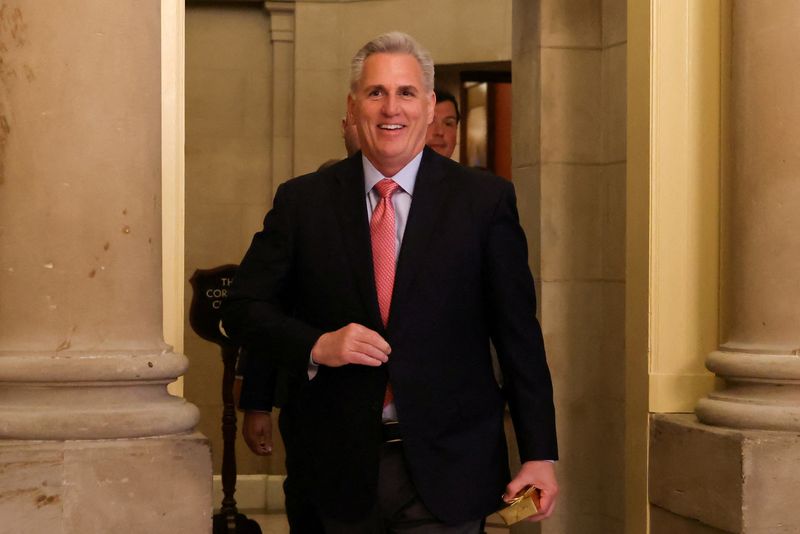WASHINGTON (Reuters) - The Republican-led U.S. House of Representatives has passed a bill that pairs $4.8 trillion of spending cuts with an increase in the federal government's $31.4 trillion debt ceiling. It has no chance of passing the Democratic-led Senate, but is meant to pressure Democratic President Joe Biden into budget talks.
Following is a summary of the package approved by the House on Wednesday.
DEBT-CEILING INCREASE
The legislation would suspend the U.S. borrowing limit, currently $31.4 trillion, through March 31, 2024, or until it increases by another $1.5 trillion, whichever comes first. At that point, Congress would have to address the issue again as the 2024 presidential campaign heats up.
SPENDING RESTRAINTS
The bill would cut a wide swath of government spending to last year's levels, a decrease of about 9%. From that point, growth would be capped at 1% annually over the next 10 years. That would save roughly $3.2 trillion, according to the nonpartisan Congressional Budget Office, compared with current projections.
It is not clear how the spending caps would affect specific government operations, though the Department of Transportation this week said it would shut down 375 air-traffic control towers and the Department of Agriculture said it could make it harder for nearly 1 million Americans to access federal food aid.
The caps would reduce spending in real terms as they would not keep up with projected inflation and population growth.
They would not apply to benefits programs such as Social Security and Medicare, which are projected to grow dramatically as the U.S. population ages.
CLAW BACK UNSPENT COVID-19 FUNDS
The legislation would cancel remaining healthcare, infrastructure, rental aid and other funds that remain unspent from the $5.2 trillion Congress approved between 2020 and 2022 to fight the COVID-19 pandemic. That would save $30 billion, according to CBO.
CANCEL STUDENT DEBT
It would undo Biden's effort to cancel up to $10,000 of student debt for some borrowers, and block another plan that would tie debt repayment to borrowers' incomes. That would save $460 billion, according to CBO.
Republicans have portrayed those programs as unfair to those who did not go to college or have paid off their debts. The Supreme Court is expected to rule before July on whether Biden's plan is legal.
IRS BUDGET
The legislation would revoke a budget increase for the Internal Revenue Service that the tax-collecting agency would use to hire more employees and deploy new technology. This would worsen the government's budget woes by $120 billion, according to CBO, as it would sacrifice the increased revenue that the IRS would generate through better tax enforcement.
REPEAL GREEN TAX INCENTIVES
The bill would repeal incentives for renewable energy, electric vehicles and other climate-friendly technology that Democrats passed last year as part of a measure called the Inflation Reduction Act. It does not target corporate tax increases, drug-pricing restraints or other aspects of that law. That would save $540 billion, according to CBO.
TIGHTEN WORK REQUIREMENTS
The legislation would stiffen work requirements for participants in some anti-poverty programs.
Childless adults up to age 56 who receive health insurance through the Medicaid program, which covers low-income people, would have to work at least 80 hours a month or participate in job training or community service.
Likewise, childless adults up to age 56 who receive food assistance through the SNAP program would lose benefits after three months if they could not prove they were working at least 20 hours a week or participating in a job training program. Those work requirements currently apply to those up to age 50.
Work requirements also would be tightened in the Temporary Assistance to Needy Families cash-assistance program.
Overall, that would reduce spending by $120 billion, according to CBO.
INCREASED AUTHORITY OVER REGULATIONS
The bill would give Congress greater power to review new rules put forward by the executive branch.
MORE INCENTIVES FOR OIL AND GAS
The legislation includes a measure that would ease fossil-fuel regulations. This already passed the House in March but has stalled in the Senate. That would save $3 billion, according to CBO.

INTEREST SAVINGS
The reduced spending would lower the U.S. government's borrowing costs by $547 billion over 10 years, according to CBO.